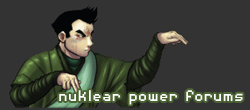

 |

|
|
|||||||
|
Click to unhide all tags.
|
Thread Tools | Display Modes |
|
|
|
|
#1 |
|
Digimon Lover
Join Date: Aug 2004
Location: Taos New Mexico
Posts: 26

|
The type of reproduction thats ants have comes from only one individual. This spread dna much less quickly. So do ants have less DNA then other insects that reproduce with more then one individual, which spreads dna more quickly? Or is new DNA diversity spread just as quickly using only one individual and I'm just imagining things? Is this one of the reasons for ants small size? I'm not really so much as starting a discussion as much as I am just wondering if anyone here would know the answer.
__________________
Flying amidst the plains, swinging an oversized fireblade, cometh DragonLord! And he gives a low roar: "I'm going to hump you with such disregard for common sense, your reincarnation will be a scientific anomaly!!!" |
|
|
|
|
#2 | |
|
Objectively The Third Worst
|
i think that ants choose there (or is that bees?) queen and if so then they could choose the best of the colony allowing for the best of genetic material to pass on influenceing the colony in a postive way.
__________________
Quote:
|
|
|
|
|
|
#3 |
|
OMG! Sea Monster!
Join Date: Nov 2003
Posts: 881

|
Well, really, ants are inbred as could be. The breeder ants all come from the same queen. I'm not a biologist, but I've never heard of colonies of ants of the same species working together and interbreeding. I don't think it happens.
I don't think that genetic stuff is as crucial to ants as it is to us humans though, we get some glaring problems after generations of inbreeding, while ants have been around pretty long and I'd assume their interbreeding is limited. But again, this is only conjecture, I'd advise you to ask someone who's studied ants. I reckon any college professor or professional (look someone up on the web) who knows about this would be more than glad to respond to an email asking about it.
__________________
daily deviations |
|
|
|
|
#4 |
|
҉҉҉҉▒▒▒▒▒▒
Join Date: Nov 2004
Posts: 279

|
That's a juivinile way of looking at evolution. It's not "less evolved", it's the best suited system for the ant in its environment.
|
|
|
|
|
#5 | ||
|
Just sleeping
|
I'll try to answer all of your questions
Quote:
Quote:
And to echo Cybren, please don't use the term "less evolved." Species don't evolve into "higher" forms; the genes that lead to better reproductive success (meaning genes that allow the individual to survive and reproduce more times and in that way create more copies of their genes) in the environment that a population inhabits get passed on, and the genes that don't lead to reproductive success don't get passed on. That doesn't mean that the new genes are superior, they're just what works at the time. by _mike
__________________
Be T-Rexcellent to each other, tako.
 Last edited by phil_mike; 03-10-2005 at 08:08 PM. Reason: mike forgot some capitals. |
||
|
|
|
|
#6 |
|
Just another NPF ghost
|
Wait but don't ants all come from the queen? They all have the same mother. What do they do if the queen dies?
__________________
I'm officaly saying it now. Due to me becomeing an MMO addict (Final Fantasy XI) I will be here not often. If you see me you are lucky. True geeks know what it is to be the friend who listens. Sensitive, intelligent, beautiful girls come to us for meaningful talk and profound empathy, then go back to their idiot boyfriends for wild, monkey sex. We need to talk less and workout more, fellas. -Joe Dodson |
|
|
|
|
#7 | |
|
Yar.
|
They all cry for a while, and then go back to ant business. Hopefully there's another female ant capable of reproduction. If there is, then the ant colony will go back to normal. If not, the colony quickly dies off because of an ant's short life span.
__________________
Quote:
|
|
|
|
|
|
#8 |
|
Shotokan Master
Join Date: Nov 2003
Posts: 529

|
ant exoskeletons aren't "weak" its just that strength increases proportionally to the cross sectional area of a muscle.
this normally means that if an ant has weight x^2, its strength is proportional to x. thus while a big ant may be stronger than a small one, a small ant is stronger per unit weight. if you factor in the exoskeleton, that means that a bigger ant would have problems moving not because their skeleton is weak, but because their muscles are rapidly outpaced by their skeleton's proportional drain on their energy. |
|
|
|
|